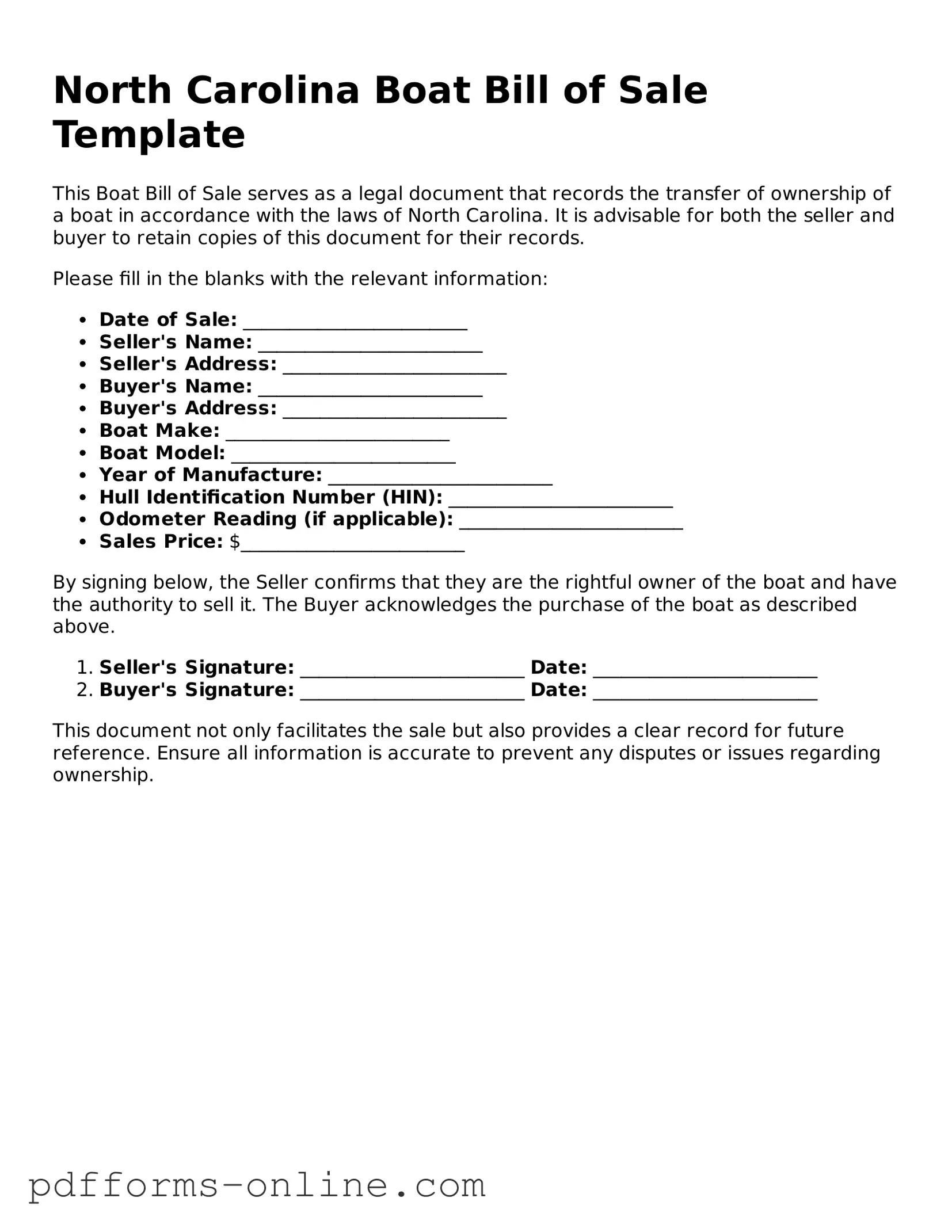The North Carolina Boat Bill of Sale form shares similarities with the Vehicle Bill of Sale. Both documents serve as proof of ownership transfer. A Vehicle Bill of Sale typically includes details such as the vehicle's make, model, year, and Vehicle Identification Number (VIN). Similarly, a Boat Bill of Sale includes the boat's make, model, year, and Hull Identification Number (HIN). Both documents protect the seller from future liability and provide the buyer with a record of the transaction.
Another document comparable to the Boat Bill of Sale is the General Bill of Sale. This form is used for the sale of personal property, including furniture, electronics, and other items. Like the Boat Bill of Sale, it outlines the details of the transaction, including the buyer's and seller's information, a description of the item sold, and the sale price. Both documents help establish clear ownership and can be used for legal purposes if disputes arise.
The Motorcycle Bill of Sale is also similar to the Boat Bill of Sale. Both documents are used to formally transfer ownership of a vehicle, whether on land or water. Each form includes pertinent information such as the seller's and buyer's details, a description of the motorcycle or boat, and the sale price. This ensures that both parties have a clear understanding of the transaction and protects their interests.
The ATV Bill of Sale serves a similar purpose as the Boat Bill of Sale. All-terrain vehicles, like boats, require proof of ownership transfer when sold. The ATV Bill of Sale includes information about the vehicle, such as its make, model, and identification number, just as the Boat Bill of Sale does. This document helps prevent disputes and establishes a clear record of ownership for both the seller and buyer.
The Trailer Bill of Sale is another document that parallels the Boat Bill of Sale. Trailers, like boats, are often sold and require documentation to confirm ownership transfer. The Trailer Bill of Sale includes details about the trailer, including its make, model, and identification number, similar to the information found in a Boat Bill of Sale. This document provides legal protection for both parties involved in the transaction.
In the realm of real estate transactions, understanding the intricacies of written agreements is paramount, especially for those entering rental arrangements. A comprehensive guiding resource for such agreements is the OnlineLawDocs.com, which provides valuable information on drafting and reviewing the Residential Lease Agreement. This document not only solidifies the expectations between landlords and tenants but also serves as a protective tool in ensuring that both parties are aware of their rights and obligations throughout the lease period.
The Firearm Bill of Sale is also comparable to the Boat Bill of Sale, as both documents are used to transfer ownership of specific items that require legal documentation. The Firearm Bill of Sale includes details about the firearm, such as its make, model, and serial number, while the Boat Bill of Sale includes similar information about the boat. Both documents ensure compliance with legal requirements and help protect the interests of both the seller and buyer.
The Aircraft Bill of Sale is another document that bears similarities to the Boat Bill of Sale. Both forms are used to transfer ownership of vehicles that require registration and compliance with specific regulations. The Aircraft Bill of Sale includes details such as the aircraft's make, model, and registration number, akin to the information found in the Boat Bill of Sale. This ensures that both parties have a clear understanding of the transaction and protects their rights.
Lastly, the Mobile Home Bill of Sale shares characteristics with the Boat Bill of Sale. Both documents facilitate the transfer of ownership of movable property. The Mobile Home Bill of Sale includes information about the mobile home, such as its make, model, and identification number, similar to what is found in a Boat Bill of Sale. Both forms are essential for establishing ownership and protecting the rights of both the seller and buyer in their respective transactions.
